The RMT is debating whether or not to affiliate. Jim Grant of Labour Party Marxists says get back in
“You can take your distance from America,” Tony Blair told the Chilcot inquiry years ago, “but you might find it is a long way back.”
So, also, it seems, is the case with taking of distance from the Labour Party. Close to 15 years after being expelled from Labour, thanks in large part to Blair’s many crimes, the Rail, Maritime and Transport union is to decide whether or not to apply for re-affiliation. The crunch moment comes on May 30, at a special general meeting.
“For many years I myself wouldn’t have dreamed that I would ever be campaigning to rejoin Labour,” Steve Hedley tells us. “So what has changed? Well, in a word, Corbyn.” Hedley is not a nobody in the RMT – he is assistant general secretary, and a long-standing militant and official in the union. He has spent most of that time on the fringes of the far left, briefly joining the Socialist Party in England and Wales (and the article quoted above was published on the Socialist Appeal website). If he has changed his mind on the matter, no doubt many others have too.
In the beginning
The story of the RMT’s relationship with the Labour Party is a long one – indeed, it is about as long as any such story could possibly be. For it was a motion originating in a branch of the Amalgamated Union of Railway Servants, one of the RMT’s ancestors, that led the Trades Union Congress to kick-start the Labour Representation Committee in 1899. Within a couple of years, there were MPs in parliament answerable, in theory, to the labour movement; and, though independence from the Liberal whip was largely a theoretical matter for Labour’s first MPs, the break was nonetheless decisively important in the history of the British workers’ movement – and for that matter in the history of ‘bourgeois’ politics in this country as a whole.
For the next century, the AURS and its successor, the National Union of Railwaymen, were core affiliates to the Labour Party; no less loyal was the National Union of Seamen, the other component part of today’s union. Even 20 years ago, with Jimmy Knapp still in the general secretary’s seat of what was by then the RMT, a break with Labour would have been quite unimaginable.
Knapp presided over some significant industrial battles, but aided and abetted Neil Kinnock and John Smith, as they paved the way for Tony Blair. In 2001, in a move reflecting deep disappointment with the first Blair government in the RMT ranks, the top job was taken by Bob Crow, an avowed communist and militant organiser. Under his leadership, RMT members in Scotland used the union political fund to sponsor candidates of the Scottish Socialist Party, which was riding high at the time; this can only have been a calculated provocation, and the inevitable result – expulsion from the ranks of Labour’s affiliates – followed in 2004.
Since then, the RMT’s political fund has been put to highly eclectic uses. The SSP, of course, collapsed into irrelevance within three years, when it split over Tommy Sheridan’s attempts to sue the Murdoch empire over allegations about his sex life. It continues to exist, just about, today; it is merely a tail of the nationalists, and a well-docked tail at that. The RMT sponsors a smattering of MPs on an individual basis – mostly Labour, but also including leftish nationalists and Greens. It has also been a primary sponsor first of the now disbanded ‘No to the EU’ ‘Lexiteer’ slate in the 2009 and 2014 European elections, and the Trade Unionist and Socialist Coalition on an ongoing basis. Electoral returns for both have been generally awful – which is to say, below the pretty poor historic standard of far-left candidates in Britain’s hostile electoral system.
Though many on the far left greeted the RMT’s break with Labour – in the context of the invasion of Iraq, top-up fees and the rest – as a great step forward, it is clear, on the evidence of the last 15 years, that it was in fact a step backpolitically for the RMT and the labour movement as a whole. The most successful use of the RMT political fund in these years, apart from supporting some Labour MPs, has been boosting petty bourgeois candidates (a matter on which those who urged disaffiliation, like SPEW, are tellingly silent).
Transformed Labour?
On the RMT’s side, then, the opportunity is there to step back into the central terrain of British labour movement politics. But not only that. As Hedley tells us, there is a serious class struggle going on for the very future of the movement itself, and the place where the battle rages is the Labour Party. Merely by making that move, Britain’s most militant union would send a very clear message. The impact of the return could – almost– be worth the wasted years in the political desert.
We are told by another advocate of reaffiliation, however, that “RMT branches are divided, and the vote at the SGM is likely to be close.” Indeed, all the signs are of a close contest. Hedley begins his article with a disclaimer – “I refuse to fall out with anyone over the debate in the RMT about reaffiliation to the Labour Party” – that suggests in itself that fur is likely to fly.
A document outlining the terms offered by the Labour Party has been circulated among RMT branches with a covering letter from general secretary Mick Cash Drawn from the response of the Labour Party to the RMT’s advances, it reads – admittedly to an outsider – like a document written by an advocate of reaffiliation who takes great pains to reassure opponents that their fears are unfounded.
So who are these opponents? We find many grumbles in the comments beneath comrade Hedley’s forthright Facebook posts, but a more systematic argument comes – where else? – from our comrades in SPEW. An article in their RMT members’ bulletin puts their case. “Socialist Party members of the RMT welcome the fact that a dialogue with the Labour Party has begun,” the comrades tell us:
A transformed Labour Party, with full democratic rights and due weight in its structures for trade unions – the collective voices of workers – would take forward the objectives of the RMT, as defined in our rule book: to “improve the conditions and protect the interests of its members” and “to work for the supersession of the capitalist system by a socialistic order of society”.
So far, so good. However, “are the terms of affiliation currently on offer – losing our political independence and handing £240,000 a year to a largely unreconstructed party machine (if we affiliate our full membership) – really the best way to pursue the RMT’s objectives at this moment?” Phrasing the question in that way, naturally, presumes an answer in the negative. The article continues:
There is nothing on what the party will do to stop Labour-controlled authorities implementing driver-only operation (DOO) and sacking guards on Merseyrail and Rail North, massive funding cuts in Transport for London, or privatisation plans for the Welsh railways. The RMT has AGM policy supporting local councils setting no-cuts budgets by using their reserves and borrowing powers. Yet rightwing Labour-led councils continue to slash jobs and local services and nothing is said about it.
There follows a fairly accurate description of the bureaucratic obstacles to Labour Party democracy, and so on, and the conclusions write themselves: “once the cheque is handed over, it’s no longer our money”; worries about the “(extremely limited) opportunities and (still considerable) overheads that affiliation would bring”.
We should start by pointing out that what the SPEW comrades are engaged in here is the spread of what public relations professionals call “fear, uncertainty and doubt”, or FUD. Note that the RMT would “lose its political independence”, apparently: the confidential document, to which the SPEW article refers, explicitly repudiates this, except in the case of standing candidates against Labour. And indeed there is nothing in the Labour Party rules that excludes (say) campaigning for immediate rail renationalisation simply because Jeremy Corbyn and John McDonnell are too timid to call for it themselves.
If we are to identify standing candidates against Labour as the blocker issue, however, then the high-minded openness to reaffiliation affected by the SPEW article is revealed as a sham, for there is exactly zero point in even a politically healthy federal party of the labour movement accepting affiliates who stand against it in elections. It seems that we founder on the great socialist principle of SPEW being permitted to do whatever the hell it likes.
There is something more troubling yet, however, about the SPEW approach to this question, which is its petty bourgeois character. We mean this in the narrowest possiblesense – SPEW behaves exactly like a provincial estate agent, obsessed with getting the better of some petty transaction. £240,000 doesn’t buy enough influence in the Labour Party.
Sectionalism
In a more expansive sense, the petty bourgeois attitude expresses itself, in the trade union movement, as sectionalism– the pursuit of the narrow aims of the union over and above those of the movement as a whole. It is thus highly regrettable that SPEW constantly encourages such sectionalism – what does the RMTget for its money? – above the general interest, which is hardly ideal from the point of view of an organisation that considers itself Trotskyist.
The best exemplar of this is the apparent expectation that an acceptable set of terms for affiliation should contain policy on driver-only operation. The proper way to settle such questions is not in market-stall haggling between the Labour Party bureaucracy and its RMT counterparts, but at conference. (Things are more commonly settled in the now smoke-free rooms of backstage stitch-ups, of course.) Say that there was Labour Party policy to nationalise the insurance industry and, as part of negotiations to get an insurance clerks’ union on board, that policy was struck off. I, and hopefully SPEW, would be less than pleased. Yet it seems to think that the RMT should expect just that sort of behaviour.
Can it really be the case that purported Trotskyists – who aspire to be the most conscious vanguard of the labour movement – should promote sectionalism as a matter of principle? Probably not. The truth is that these sad little contortions are designed for internal consumption; the lukewarm participation of the RMT in Tusc is all that keeps it afloat and, once it is gone, the last 25 years of SPEW strategy are basically buried.
But for the moment SPEW is committed to Tusc. The April 25 edition of The Socialist urged readers to “Vote Trade Unionist and Socialist Coalition” in the May 3 local elections in England – without exception, it seems: the front-page article makes no mention of voting for any Labour candidates in the vast majority of seats, where Tusc is not contesting. After all, “Today Blairite councils around the country are implementing huge cuts to public services. That is why the Socialist Party is standing, as part of the Trade Unionist and Socialist Coalition, against some of the worst Blairite cutters at local level.”
Yet, in the same article, we read this:
As we have repeatedly warned, making concessions to the pro-capitalist wing of the Labour Party, and attempting to conciliate with them, will only give them more power to try and defeat Corbyn. Not one inch should be conceded to them. Instead urgent measures are needed to completely transform the Labour Party into a mass socialist, working class party, with a revitalised trade union movement involved at its core through democratic, representative structures.
So how are those “urgent measures” to be won? How about winning the unions to fight for them within Labour itself? Oh no – that would be a waste of money.
Yet, as SPEW’s perspective of creating a Labour Party mark two is progressively invalidated by events, so SPEW comrades are voting with their feet and condemning themselves to a life of ‘poor value for money’ in the Labour Party – those left behind are more and more the irreconcilable and the delusional. The silver lining is that – in precisely the far-sighted spirit of the Communist manifesto– SPEW tends to find it amenable to take its political lead from the RMT, so perhaps a well-advised decision on May 30 will bring Peter Taaffe’s merry men and women finally to the same conclusion.
As already noted, however, a good outcome is far from guaranteed. If it is a close vote against reaffiliation, that will hardly cover SPEW in glory – and we shall say no more than that. To RMT members, we commend the larger view of politics, and hope that those of us wanting to truly transform Labour, rather than wait passively for it to be transformed for us, are soon to be joined by the battered British labour movement’s most militant contingent.
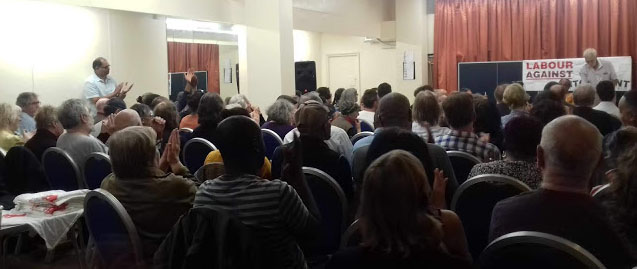

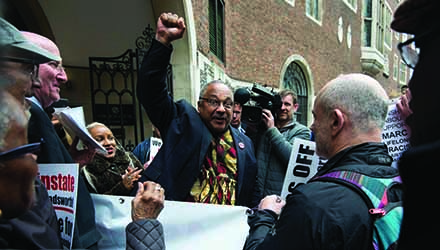

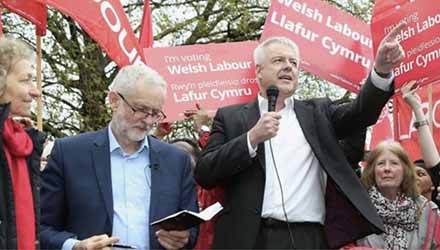

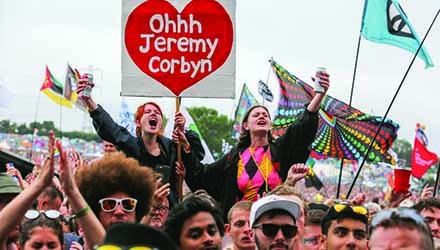
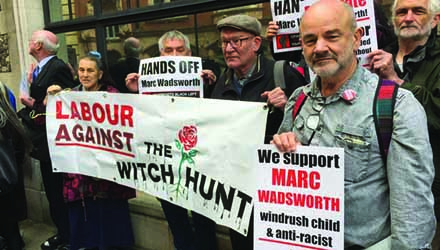
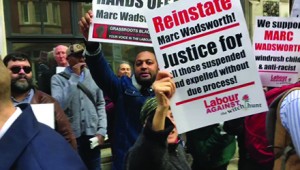 Despite the fact that his words can be clearly heard on social media – thanks to those who recorded the question-and -answer session – the charges against him were not dropped. Yet no honest person could seriously interpret what he said as anti-Semitic. It therefore says a lot about the current climate that such a remark can be weaponised in this cynical way. True, just as with Ken Livingstone, amongst others, the charge of anti-Semitism against comrade Wadsworth was eventually replaced with the catch-all of “bringing the party into disrepute” and it was on the basis of this charge that the hearing took place on April 25 (as we go to press, the two-day-hearing is still ongoing).
Despite the fact that his words can be clearly heard on social media – thanks to those who recorded the question-and -answer session – the charges against him were not dropped. Yet no honest person could seriously interpret what he said as anti-Semitic. It therefore says a lot about the current climate that such a remark can be weaponised in this cynical way. True, just as with Ken Livingstone, amongst others, the charge of anti-Semitism against comrade Wadsworth was eventually replaced with the catch-all of “bringing the party into disrepute” and it was on the basis of this charge that the hearing took place on April 25 (as we go to press, the two-day-hearing is still ongoing).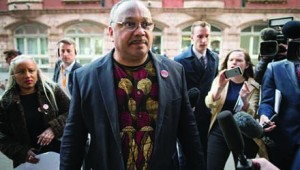 Elsewhere Streeting has stated: “That it was necessary to accompany her through a protest is an appalling state of affairs.” Necessary?
Elsewhere Streeting has stated: “That it was necessary to accompany her through a protest is an appalling state of affairs.” Necessary? 